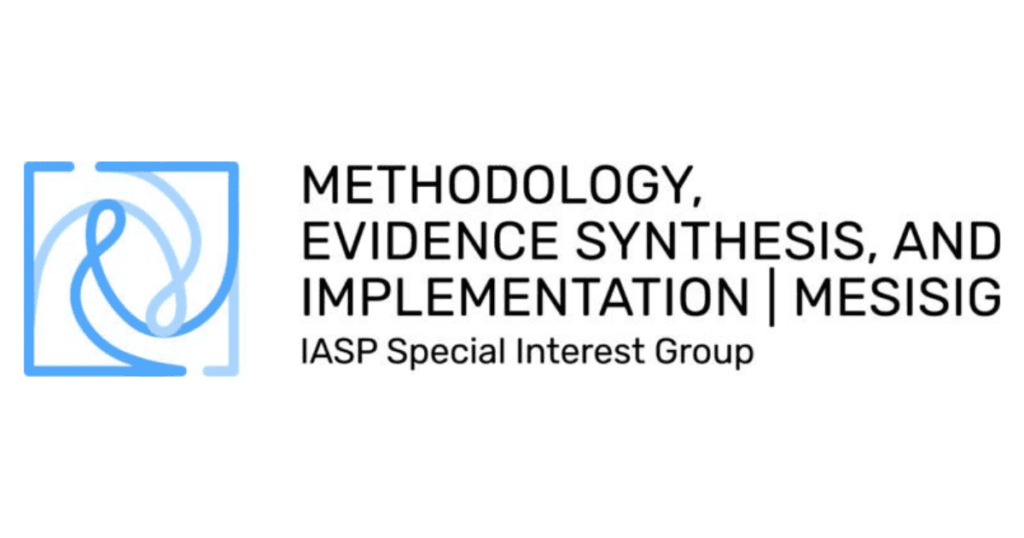Join us as we discuss how to obtain meaningful data, publish impactful papers, secure research funding, and advance your career trajectory.
Date: Wednesday, January 29, 2:30 p.m. to 4:00 p.m., Eastern (US) Time
This webinar is being produced by the International Association for the Study of Pain’s Methodology, Evidence Synthesis, and Implementation Special Interest Group (MESISIG). The MESISIG aims to:
- Foster a widespread interest in the production, methods, and critical appraisal of high-quality evidence and evidence synthesis.
- Provide a forum for the dissemination and promotion of skills, methodological best practices, and innovations across the full breadth of pain research.
For pain research to be trustworthy and valuable for all members of society, it must strive to be equitable, diverse, and inclusive. This requires confronting discriminatory and oppressive practices to assist in developing and promoting these values in our research communities, to be used in how we undertake research, and how and with whom research is communicated. In this MESISIG workshop, we are delighted to welcome three international researchers who have demonstrated outstanding leadership in this area. Talks will make the case for improving practice and give practical examples of how, as a research community, we can move toward more equitable, diverse, and inclusive research.
Participants include:
- Anna Hood, PhD – University of Manchester, UK
Why equity, diversity, and inclusion are critical to trustworthy evidence, the case for change, and actionable steps to achieve good practice - Emma Karran, PhD – University of South Australia, Adelaide, Australia
Shining a light on ED&I through improved data collection and reporting - Hemakumar Devan, MPhty PhD – University of Otago, Wellington, New Zealand
Coproducing knowledge with indigenous communities, successes and challenges - Neil O’Connell, PhD – Brunel University London, UK (moderator)
About the Presenters
 Anna Hood, PhD, is a lecturer (assistant professor) in psychology in the Division of Psychology and Mental Health and the policy director at the Manchester Centre for Health Psychology at the University of Manchester. She is a clinical health psychologist, and completed her graduate and postdoctoral training in the US and the UK at Washington University in St. Louis, Cincinnati Children’s Hospital Medical Center, and UCL, Great Ormond Street Institute of Child Health. Hood’s research examines the biopsychosocial challenges faced by pediatric patients living with pain, with a particular focus on children and young adults living with sickle cell disease. She has published extensively and collaborates on projects to understand pain from structural perspectives, develop mechanisms for restoration, and create pathways for justice to eliminate pain inequities. Hood was recently awarded the International Association for the Study of Pain (IASP) Ulf Lindblom Young Investigator Prize for Clinical Science for her work with youth living with sickle cell disease. She serves on the IASP Presidential Task Force for Sustainability and the SPP Presidential Task Force for Advocacy. She also provides expertise on the UK Research and Innovation Medical Research Council Black in Biomedical Research Advisory Group, the American Society of Hematology Roadmap to Improve DEI in Hematology Clinical Trials, and the National Institute for Health Research James Lind Alliance Sickle Cell Genomics Priority Setting Partnership.
Anna Hood, PhD, is a lecturer (assistant professor) in psychology in the Division of Psychology and Mental Health and the policy director at the Manchester Centre for Health Psychology at the University of Manchester. She is a clinical health psychologist, and completed her graduate and postdoctoral training in the US and the UK at Washington University in St. Louis, Cincinnati Children’s Hospital Medical Center, and UCL, Great Ormond Street Institute of Child Health. Hood’s research examines the biopsychosocial challenges faced by pediatric patients living with pain, with a particular focus on children and young adults living with sickle cell disease. She has published extensively and collaborates on projects to understand pain from structural perspectives, develop mechanisms for restoration, and create pathways for justice to eliminate pain inequities. Hood was recently awarded the International Association for the Study of Pain (IASP) Ulf Lindblom Young Investigator Prize for Clinical Science for her work with youth living with sickle cell disease. She serves on the IASP Presidential Task Force for Sustainability and the SPP Presidential Task Force for Advocacy. She also provides expertise on the UK Research and Innovation Medical Research Council Black in Biomedical Research Advisory Group, the American Society of Hematology Roadmap to Improve DEI in Hematology Clinical Trials, and the National Institute for Health Research James Lind Alliance Sickle Cell Genomics Priority Setting Partnership.
 Emma Karran, PhD, is a Post-Doctoral Research Fellow at the University of South Australia whose research is both driven and informed by her extensive experience as a Physiotherapy Clinician and Educator. Emma’s current research interests relate to exploring the role of the social determinants of health in persistent pain and enhancing health equity in pain research and practice. She currently leads an international group of pain and equity experts and key stakeholders in a project to develop a minimum dataset to facilitate the routine collection of ‘equity-relevant’ data in all human pain research (www.isshoos.org).
Emma Karran, PhD, is a Post-Doctoral Research Fellow at the University of South Australia whose research is both driven and informed by her extensive experience as a Physiotherapy Clinician and Educator. Emma’s current research interests relate to exploring the role of the social determinants of health in persistent pain and enhancing health equity in pain research and practice. She currently leads an international group of pain and equity experts and key stakeholders in a project to develop a minimum dataset to facilitate the routine collection of ‘equity-relevant’ data in all human pain research (www.isshoos.org).
 Hemakumar Devan, MPhty PhD is a lecturer in the Department of Medicine at the University of Otago. His primary research interest is to foster self-management support to empower people who experience persistent pain and their whānau (family and significant others). The program has three main themes. The first theme is a digital health program (Pain BITS – Behavioral Intervention Technologies) to support self-management via technology, which involves co-creation of digital resources (website, apps, and social media) by and for people living with persistent pain. The second theme focuses on partnering with Māori, Pasifika, and Asian communities to co-develop culturally responsive pain management services (online and in-person) to address inequities in pain management. As part of this theme, he is currently co-leading a project to develop a community-led pain support program for Māori with pain. The third theme aims to improve societal representations of people with pain using art-based, integrated knowledge translation approaches (e.g., stories, illustrations and films). Strategically, his goal is to address health inequities and improve health outcomes for people with persistent pain and their whānau.
Hemakumar Devan, MPhty PhD is a lecturer in the Department of Medicine at the University of Otago. His primary research interest is to foster self-management support to empower people who experience persistent pain and their whānau (family and significant others). The program has three main themes. The first theme is a digital health program (Pain BITS – Behavioral Intervention Technologies) to support self-management via technology, which involves co-creation of digital resources (website, apps, and social media) by and for people living with persistent pain. The second theme focuses on partnering with Māori, Pasifika, and Asian communities to co-develop culturally responsive pain management services (online and in-person) to address inequities in pain management. As part of this theme, he is currently co-leading a project to develop a community-led pain support program for Māori with pain. The third theme aims to improve societal representations of people with pain using art-based, integrated knowledge translation approaches (e.g., stories, illustrations and films). Strategically, his goal is to address health inequities and improve health outcomes for people with persistent pain and their whānau.
About the Moderator
 Neil O’Connell, PhD, is a professor of evidence-based healthcare in the Physiotherapy Division of the Department of Health Sciences at Brunel University London. He divides his time between teaching and research, and previously worked as a musculoskeletal physiotherapist. O’Connell’s research interests focus on the evidence-based management of persistent pain, and he has published extensively in this area. He also leads and teaches modules on clinical research methods and evidence-based practice for pre- and post-graduate clinicians. O’Connell was the coordinating editor for the Cochrane Pain, Palliative and Supportive Care (PaPaS) group from 2020-2023, and is a member of Cochrane’s central editorial board. He was a member of the Guideline Development Group for the UK’s National Institute of Health and Care Excellence (NICE) 2016 clinical guideline on the management of low back pain and sciatica, and was a specialist committee member for the NICE Quality Standard on that topic. He is the current chair of the International Association for the Study of Pain (IASP) Methods, Evidence Synthesis and Implementation Special Interest Group (MESISIG). He is the scientific coordinator ENhancing TRUST in Pain Evidence (ENTRUST-PE) network supported by the ERA-NET Neuron Cofund.
Neil O’Connell, PhD, is a professor of evidence-based healthcare in the Physiotherapy Division of the Department of Health Sciences at Brunel University London. He divides his time between teaching and research, and previously worked as a musculoskeletal physiotherapist. O’Connell’s research interests focus on the evidence-based management of persistent pain, and he has published extensively in this area. He also leads and teaches modules on clinical research methods and evidence-based practice for pre- and post-graduate clinicians. O’Connell was the coordinating editor for the Cochrane Pain, Palliative and Supportive Care (PaPaS) group from 2020-2023, and is a member of Cochrane’s central editorial board. He was a member of the Guideline Development Group for the UK’s National Institute of Health and Care Excellence (NICE) 2016 clinical guideline on the management of low back pain and sciatica, and was a specialist committee member for the NICE Quality Standard on that topic. He is the current chair of the International Association for the Study of Pain (IASP) Methods, Evidence Synthesis and Implementation Special Interest Group (MESISIG). He is the scientific coordinator ENhancing TRUST in Pain Evidence (ENTRUST-PE) network supported by the ERA-NET Neuron Cofund.


